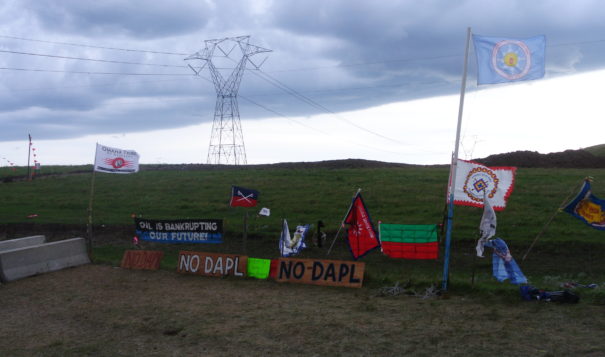
| Relatives, We write to you today with good news, we are celebrating a win for the sovereignty of the Standing Rock Sioux Tribe and the Cheyenne River Sioux Tribe to fight for the protection of their traditional lands and territories against Energy Transfer Partners’ Dakota Access Pipeline. Today a federal judge ordered Dakota Access, LLC a subsidiary of Energy Transfer Partners, to shut down and empty their Dakota Access Pipeline by August 5th. This order is part of an ongoing lawsuit filed by the Standing Rock and Cheyenne River Sioux Tribes. The court recently found that the U.S. Army Corps of Engineers had violated the National Environmental Policy Act when it granted an easement to Dakota Access, LLC, due to a failure to conduct a full environmental impact review on the project. This newest decision by the court orders the pipeline to shut down within 30 days and to remain shut down until the environmental review is complete. |
The Court order states that: 1) The Mineral Leasing Act easement authorizing the Dakota Access Pipeline to cross the Missouri River at Lake Oahe is hereby vacated; and 2) Dakota Access shall shut down the pipeline and empty it of oil by August 5, 2020. Signed by Judge James E. Boasberg on 7/6/2020.
“This is a big win for the Oceti Sakowin or Great Sioux Nation and all our ally tribes and friends who came to stand with us to protect water and the future of our children. We said from the beginning that the crossing of the Missouri river was illegal and that an EIS was necessary. I’m glad the judge saw the inherent dangers of keeping the oil flowing on DAPL while this study moves forward. That in of itself is vindication for all the trials we went through. This is a win for the grassroots people of the Oceti Sakowin and I couldn’t be happier.” said Joye Braun, the first camper at Sacred Stone Camp.

| This order vindicates the many prayers, actions, and legal arguments of Oceti Sakowin – Seven Council Fires of the Dakota, Nakota, Lakota tribal nations and communities. The Standing Rock and Cheyenne River Sioux Tribes have shown the world that treaty rights and environmental justice are not token concepts without merit, but rather tangible arguments that inherently protect the sacredness of Unci Maka – Mother Earth. “Today is a historic day for the Standing Rock Sioux Tribe and the many people who have supported us in the fight against the pipeline,” said Chairman Mike Faith of the Standing Rock Sioux Tribe. “This pipeline should have never been built here. We told them that from the beginning.” We relish this moment as we remember the smell of the many fires at the encampment and the thousands of people who journeyed to Standing Rock to stand with the peoples of Oceti Sakowin. This moment is medicine to all who endured during this fight and reminds us to keep fighting for the protection of water and the release of the political prisoners like Red Fawn who still suffer from the stand they took. We remain committed to protecting Father Sky, Mother Earth, the sacred waters, and our future generations. We will continue to fight for the protection of our sacred lands, precious cultural sites, and until fossil fuels are kept in the ground. Established in 1990, The Indigenous Environmental Network is an international environmental justice nonprofit that works with tribal grassroots organizations to build the capacity of Indigenous communities. IEN’s activities include empowering Indigenous communities and tribal governments to develop mechanisms to protect our sacred sites, land, water, air, natural resources, the health of both our people and all living things, and to build economically sustainable communities. Learn more here: ienearth.org |
